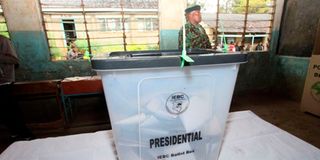Strengthening campaigns for independents

A police officer stands guard during the repeat presidential election in 2017.
One remarkable element in this year’s polls is the overwhelming number of independent candidates who are running for office. These individuals have chosen people power alone as an avenue to victory.
Party politics has been too contentious for many, even the public, let alone those with political aspirations.
This situation is, therefore, an indirect suggestion for political parties that want to grow to do more work outside campaign time to canvas for members, and grow deeper community roots so that the public can get much more sustainably engaged in the choice of a candidate long before the elections.
The practical truth of our way of governance is that without party backing, it becomes very difficult for an independent candidate to plan for collaborative lawmaking, or even group projects and implementation, which are far easier negotiated at the party level.
Many essential political moves are impossible without significant consensus building and discussions across many aisles, which are facilitated by party strategy and membership.
As such, an independent candidate's campaigns must include three key elements to be successful. The first is a clear awareness of the solitary decisions and actions of their target office, which is one of their biggest strengths.
As one who is not from a party, an independent candidate’s key strength is full clarity about the possibilities and limits of their chosen individual approach. This will let the public know what they can achieve once they are in office.
Support systems
The second way to strengthen their campaigns is to reveal to the public who their support systems are, and why these are useful. It is very clear that no candidate, even an independent one, can pull off a campaign completely alone.
It is, therefore, important that the independent candidate is transparent about the teams and communities behind them so that voters know exactly what they are signing up for and who they will be joining.
Lastly, the independent candidate needs to discuss accountability openly. Despite all the challenges of a political party approach, when party members fail, they can be called to order by party leadership and rules.
When independent candidates say they are answering the call of the people to run, they should also expect to respond to this call even in responding to criticism or displeasure by the same people, and campaigners should be open about how this will be established and sustained.
The position of the independent candidate is not an easy one, but it remains a beacon of hope for many Kenyans who feel alienated and distant from political party work and methods.
Independent candidates in Kenya should thus take the opportunity to front themselves as honestly as possible to engender the full trust of the public as they seek office come August 9.
Ms Okore is a policy analyst. [email protected]





